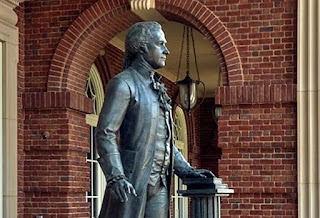Crow also laid out a lot of money to neoclassical sculptors, with mixed results. Which is not really a complaint; when you commission new work from real artists you always run the risk of getting something strange, and kudos to Crow for patronizing people capable of surprising us.One of the distinctive things about Old Parkland, and probably the thing most central to Crow's personal vision, is the theme of patriotic virtue. So we get sculptures of Washington and Hamilton interspersed with textual exhortations to be good.Which sort of culminates in this work, Non Sibi by Chas Fagan, celebrating the heroes of 9-11. That's the "let's roll" moment on Flight 93.
I don't want to be too snarky about this, that was a real moment of heroism that might have saved hundreds of lives. Public sculpture is also, at least sometimes, supposed to resonate with the public, and I bet this resonates with far more Americans than anything abstract ever will.
So it isn't that I much mind anything that is depicted at Old Parkland; my gripes have more to do with what is left out. For starters, Abraham Lincoln; to me, a roll of American heroes that has room for Hamilton and random Revolutionary soldiers (and buffalo and grizzly bears) but not Lincoln smacks of neoconfederate reaction. It smacks of writing certain very important things out of the story to make it narrower, to make it the story of one kind of person and one kind of idea. The real story is something very different.
I am an American patriot in a profound way; I love this country, and I feel lucky to have been born here at the height of our power and glory. But I find the patriotism of people like Harlan Crow weirdly limited, and I mean weirdly; I just don't get how you can love America while leaving out so much of what makes our story amazing. Ours is not just the story of robust manly heroes of liberty. It is the story of mad adventures, utopian dreamers, scheming traitors, desperate immigrants, clever inventors, cruel slave drivers, bold rebels, stubborn prairie farmwives, masters of gerrymandering, apocalyptic prophets, drag queens, self-sacrificing saints, libertarians, communists, death-crazed gunmen, hippies, yippies, video game designers, the Society for Cutting Up Men, the Black Panthers, the Federalist Society. It is a story of riotous cultural invention: blues, jazz, rock and roll, honty tonk, grunge, emo, abstract expressionism, pop art, comic books, superheroes, science fiction, the hollywood blockbuster, the Lindy, the Twist, the Twitter thread, the flame war.
What makes me uncomfortable about Harlan Crow's vision is the same thing I dislike in histories written by the woke: the narrowness. I hate the exclusion, the insistence on defining one path as the only correct one and shunning everything else. In my sculpture park, every statue of a Hamilton or Washington will be accompanied by one of Susan B. Anthony or Eugene Debs or Andy Warhol. I hate the refusal to see the ambiguity of everything, to recognize the excellent qualities even of awful or desperate people, to understand that a world in which everyone agreed on how to live would be a dismal, boring place. American history is the history of disagreement and conflict, and if you hate that then as far as I am concerned you don't really love this country.
To get back to architecture: what I like about Old Parkland is the way it broadens the horizons of contemporary design, rejecting the spare modernism that we have too much of already. What I dislike is that it rejects the modern straightjacket only to don a different one, the limitations of patriotic neoclassicism. Not entirely, which is how the project ended up producing much that is worthy of praise: the wonderful wooden floors, the amazing ironwork, the beautiful, luxurious spaces.
What Old Parkland achieves is the expression in brick and stone of a certain outlook on the world, both politically and aesthetically. That outlook is mercantile, traditional, Texan, patriotic in a certain limited sense. That was probably Crow's aim, and he achieved it. But Crow's outlook is very different from my own, which is why I can admire this from afar but not welcome it into my heart.

























No comments:
Post a Comment